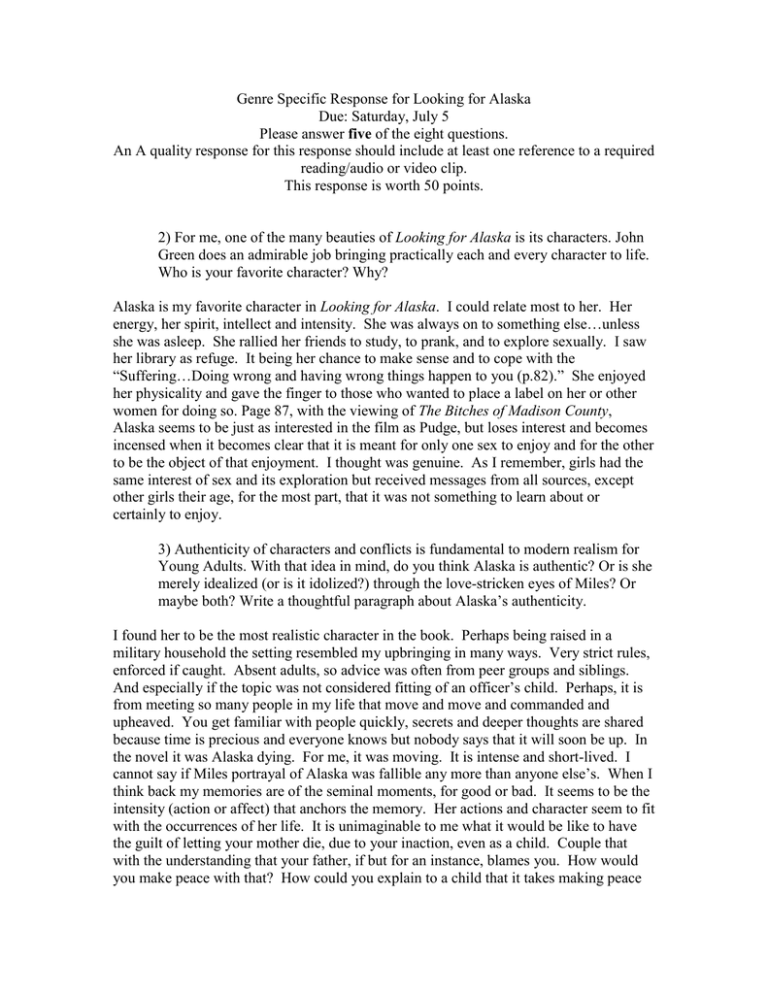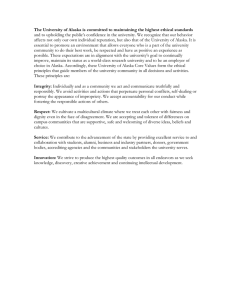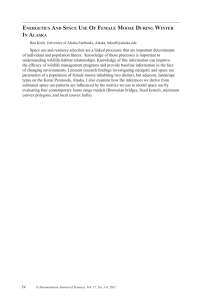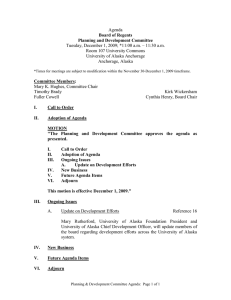Genre Specific Response for Looking for Alaska Due: Saturday, July 5 five
advertisement

Genre Specific Response for Looking for Alaska Due: Saturday, July 5 Please answer five of the eight questions. An A quality response for this response should include at least one reference to a required reading/audio or video clip. This response is worth 50 points. 2) For me, one of the many beauties of Looking for Alaska is its characters. John Green does an admirable job bringing practically each and every character to life. Who is your favorite character? Why? Alaska is my favorite character in Looking for Alaska. I could relate most to her. Her energy, her spirit, intellect and intensity. She was always on to something else…unless she was asleep. She rallied her friends to study, to prank, and to explore sexually. I saw her library as refuge. It being her chance to make sense and to cope with the “Suffering…Doing wrong and having wrong things happen to you (p.82).” She enjoyed her physicality and gave the finger to those who wanted to place a label on her or other women for doing so. Page 87, with the viewing of The Bitches of Madison County, Alaska seems to be just as interested in the film as Pudge, but loses interest and becomes incensed when it becomes clear that it is meant for only one sex to enjoy and for the other to be the object of that enjoyment. I thought was genuine. As I remember, girls had the same interest of sex and its exploration but received messages from all sources, except other girls their age, for the most part, that it was not something to learn about or certainly to enjoy. 3) Authenticity of characters and conflicts is fundamental to modern realism for Young Adults. With that idea in mind, do you think Alaska is authentic? Or is she merely idealized (or is it idolized?) through the love-stricken eyes of Miles? Or maybe both? Write a thoughtful paragraph about Alaska’s authenticity. I found her to be the most realistic character in the book. Perhaps being raised in a military household the setting resembled my upbringing in many ways. Very strict rules, enforced if caught. Absent adults, so advice was often from peer groups and siblings. And especially if the topic was not considered fitting of an officer’s child. Perhaps, it is from meeting so many people in my life that move and move and commanded and upheaved. You get familiar with people quickly, secrets and deeper thoughts are shared because time is precious and everyone knows but nobody says that it will soon be up. In the novel it was Alaska dying. For me, it was moving. It is intense and short-lived. I cannot say if Miles portrayal of Alaska was fallible any more than anyone else’s. When I think back my memories are of the seminal moments, for good or bad. It seems to be the intensity (action or affect) that anchors the memory. Her actions and character seem to fit with the occurrences of her life. It is unimaginable to me what it would be like to have the guilt of letting your mother die, due to your inaction, even as a child. Couple that with the understanding that your father, if but for an instance, blames you. How would you make peace with that? How could you explain to a child that it takes making peace with that every day, and some days every moment? Her character was real for me. Her grief was believable and her affect powerful. 4) In virtually all of our required readings for this lesson, the authors of those articles address violence, sex, profanity, and other potentially controversial content in YA realism. Shelley Stoehr writes precisely about that content in her essay “Controversial Issues in the Lives of Contemporary Young Adults.” Were you surprised by some of the content and language found in Looking for Alaska? Do you think the book could be challenged in the community where you live? (Looking for Alaska was subject to a controversial book challenge at my wife's high school; the parent actually read some of the more provocative scenes out loud at a school board meeting.) Write a thoughtful paragraph in which you comment on John Green’s use of sex, profanity, and alcohol in this novel. Did you find the content gratuitous? Or spot-on? Or perhaps even tame? I really did not notice the language of the book due to its setting. Having family that has attended military academies has provided me with stories of similar experiences and language. It never read as out of place or overused. In my county, I believe if it was on the required high school reading list that it would be challenged. My community has a Christian college as one of its largest employers and every government meeting starts with prayer. Even the strategic plan for the county mentions God, worship and service. I do not feel this is a bad thing, unless it breaks down the opportunity for dialogue and the healthy exchange in the difference of opinion. The public library I currently work in had a copy added to the collection in May 2013, four months later it went missing and has never been replaced. This could mean nothing, or it could be that someone did not like the content and it therefore never made it back to the shelves. It is interesting that due to its popularity that it was not re-ordered. I will be re-ordering it. We will see. John Green’s use of sex, profanity and alcohol all seem appropriate to the teenage experience. It surprises me that the coming of age experiences are considered inappropriate. Coming of age for me, means the experiences that shape one as they become an adult and take on the community expectations and responsibilities. These issues, substances and experiences are part of a teen’s world for better or worse. I found that through this novel one get to experience these issues vicariously and have a real opportunity for critical thinking as to how a teenage might have handled themselves. It is not that I feel these issues should be flaunted or encouraged but dealt with realistically and at every available opportunity discussed. We have segmented our communities so that multigenerational experiences and exchanges are kept to a minimum thereby losing access to wealth of knowledge and experience. 5) Boarding schools make an ideal setting for YA novels. If authors need to “get rid of the parents” as Nancy Werlin suggests, then why not set the narrative in a boarding school like Culver Creek? (Personal opinion is that Culver Creek reminds me more of a small liberal arts college than a private secondary school, but that’s getting off the subject.) Nonetheless, a few adults still play important roles—for better or for worse--in the novel. Comment thoughtfully on the role of three adults in Looking for Alaska. The three adults, whose roles made the most impact on my reading of Looking for Alaska, are Dolores, Dr. Hyde and the Eagle. Dolores, the Colonel’s mom, on Thanksgiving gave thanks for: “She was grateful that her phone was back on, that her boy was home, that Alaska helped her cook and that I had kept the Colonel out of her hair, that her job was steady and her coworkers were nice, that she had a place to sleep and a boy who loved her (p.93)” In that blessing was everything that the Colonel had been demonstrating towards his mom and his friends. Emphasis on the simply things, the people in your life, especially the people who are in the room with you, and the love of family. She was accepting of herself and those around her. She took a moment to mention the each teen at the table and say how they made her day better. To me she represented acceptance, the enjoyment of the simple things, and the importance of family and friends and that it is better to share what you have over worrying about how it may be perceived or received. She did not let her son off the hook, with his flippant thanks, but slowed him down to think again…even if the response was still cheeky. Dr. Hyde, the World Religions’ teacher, was brave in his final exam. He got the class to think about the loss of their classmate and friend. He asked them “How will you—you personally—ever get out of this labyrinth of suffering?” (p.215) He does relate it to the material covered over the term, shows respect and mentions their classmate by name. This is an exercise that by doing will assist all the students in their grieving and as well as provides them an experience that life does not stop while one grieves. It provides the class with the opportunity to look at the loss of Alaska with a thinking mind as well as with the heart, by making the question personal. The Eagle is Culver’s Creek dean, also less known as Mr. Starnes. He is the loco parentis of the students. He sets the rules and is firm. He involves students in the disciplinary action of those that infringe upon these rules. He is the rock, the one place that the students know what expectations are to be met and upheld. After the Speaker Day prank, the Eagle was firm still, and showed that he too missed Alaska. 8) Miles goes to Culver Creek to seek the “Great Perhaps.” Meanwhile, Alaska ponders how “to escape this labyrinth of suffering.” These statements are representative of the questions many teens face as they mature into adults. In a reflective paragraph, comment on the coming of age themes in Looking for Alaska. Some of the coming of age themes covered in Looking for Alaska are sex, hazing, smoking, alcohol, driving while under the influence and its consequences, love, grief and suffering. These are many of the issues that a teen’s developing awareness will encounter as they age and then experience consistently throughout their adult life. Looking for Alaska tells a story that is believable and talks of what teens face today. Miles (Pudge) comes into contact with situations that introduce him to the ‘adult experience.’ The desire to know the why of things, as they pertain to him, begins to grow. Pudge struggles with having Lara, but wanting Alaska; assisting Alaska’s departure on the night of her death; coping with her death; and learning to share that loss with his friends but also that he does not have a monopoly on it. Alaska, creates the opportunity for discussion on sex and objectification of a sex; reckless driving, drinking and driving while intoxicated. The Colonel, opens up the topics of poverty and elitism. As Matt de la Pena says in his article, Seeing Themselves in Books, Young Adult literature is big with teens “because they identify with the characters, because they’re living the stories.” Bibliography de la Pena, M. (2012, December 19). The Opinion Pages, ROOM for DEBATE, Seeing Themselves in Books. Retrieved from The New York Times: http://www.nytimes.com/roomfordebate/2012/03/28/the-power-of-young-adultfiction/young-people-can-see-themselves-in-books Green, J. (2005). Looking for Alaska. New York: speak.



